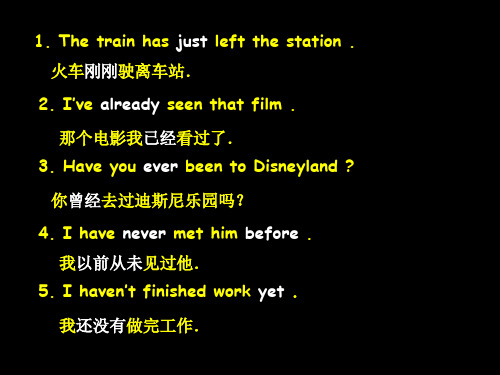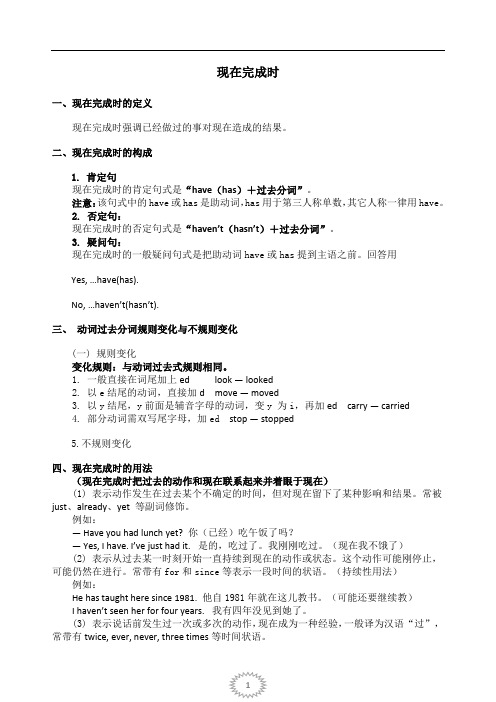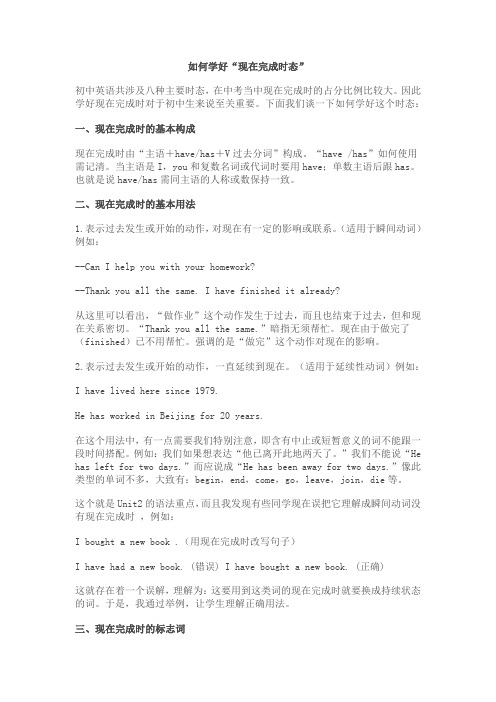现在完成时(_new)
- 格式:ppt
- 大小:662.50 KB
- 文档页数:30


现在完成时(单选题 30题含解析)初中英语专题练习一、单选题(共30题)1.—Where is your father, Tom?—He ________ the supermarket.A.has been to B.has gone to C.was going to D.have gone to 2.—I’m sorry for being late.—Never mind. The meeting ________ for only 5 minutes. This way, please.A.has started B.has been over C.has ended D.has been on3.The books ________for two weeks.A.may be kept B.may keep C.borrow D.are borrowed4.—Dad, I couldn’t turn on my computer yesterday but I have to use it today.—Oh, I ________ it. You can work on it now.A.will fix B.am fixing C.fixed D.have fixed5.In the sentence “I have bought a new bicycle, so I can ride to school now.”, we use present perfect tense to tell ________.A.the result of a past actionB.actions that happened in the pastC.actions that happened at a certain time in the pastD.how many times an action has happened till now6. Britain ________ to leave European Union last year. David Cameron, former Prime Minister________ since then.A. decided; retiredB. decided; has been retiredC. has decided; retiredD. has decided; has retired7.—Jenny, you are so beautiful in your new dress!—Thanks! But I __________ it for several times.A. wearB. will wearC. was wearingD. have worn 8.—Is this your camera?—Yes, I ________ it for two weeks.A. boughtB. hadC. have hadD. have bought9. The shop in Wanda Square _________ for six years, but I _________ there so far.A. has opened; haven’t goneB. has been opened; haven’t beenC. has been open; haven’t goneD. has been opened; haven’t been 10.—Mary, it’s really nice to see you again. Where have you ________?—I ________ a school in a mountain area for two years.A.gone; have been to B.been; have been to C.gone; have been in D.been; have been in 11.— Where will you visit during the coming summer holiday?—I’m not sure. Maybe I will go to Sanya. One of my best friends _________ Hainan twice and he says it is good place to visit.A.has gone to B.has been in C.has been to D.has been 12.—How long can I ______ these books?—At most for a month, then you have to return them to the library.A.keep B.lend C.have D.borrow13.—________ you ________ your homework yet?—Yes. I ________ it a moment ago.A.Did; do; finished B.Have; done; finishedC.Have; done; have finished D.will; do; finish14.—Mary, I remember you _________ several years ago.—Yes, I _________ for 3 years.A.married; have married B.married; marriedC.married; have been married D.have married; have been married15.Which sentence is correct?A.I wonder where you have gone. B.I wonder where they visited.C.I wonder when you have finished the task. D.I wonder what is the matter with you.16.Sophie and I are good friends. We ________ each other for four years.A.know B.knew C.have known D.will know17.I ________ my computer for ten years, but it still works well.A.bought B.have had C.have bought D.buy18.—It’s ten years since we ________ here.—How time flies! We ________ in China for so long.A.come; work B.came; worked C.come; will work D.came; have worked 19.You have never been to the History Museum, ________?A.are you B.did you C.have you20.—Can you tell me the ________ of the bag?—Sorry. I haven’t ________ it.A.weight; weight B.weighed; weighed C.weight; weighed D.weighed; weight 21.— Is Tom at home?— No, he ________ to the town.A.has been B.has gone C.goes D.will go22.Maybe Tom ________ his work. The light in his room is still on.A.doesn’t finish B.didn’t finish C.won’t finish D.hasn’t finished 23.So far, I ________ two books by Liu Cixin. One is The Wandering Earth and the other is The Three-Body Problem.A.read B.have read C.was reading24.—Is Tom at home now?—No, he ___________ the supermarket. But he will come back soon.A.has gone in B.has gone to C.has been in D.has been to 25.—________ the movie ________?—________.A.When did; start; Since 3 o’clock agoB.How long was; on; Since at 3 o’clockC.When has; started; Since 3 o’clock beforeD.How long has; been on; Since 3 o’clock26.I am not sure how long Oliver ________.A.has joined the army B.has joined in the armyC.has served the army D.has served in the army27.Tom has lived in Shanghai _________ 2003. He has live here _________ many years. A.in; for B.since; for C.since; at D.in; since28.It ________ the first time that ________ New York, because there is a photo of him in front of the Empire State Building hanging in his room.A.is; Byron has been in B.isn’t; Byron has gone toC.is; Byron has been for D.isn’t; Byron has been to29.My parents ________ to Los Angeles before.A.were B.will be C.are D.have been30.—Have scientists found any life on Mars?—No, they ________ any living things on any other plane till now.A.are discovering B.didn’t discover C.haven’t discovered D.discovered【参考答案】一、单选题(共30题)1.B【解析】句意:——汤姆,你爸爸在哪儿?——他去超市了。



现在完成时一、现在完成时的定义现在完成时强调已经做过的事对现在造成的结果。
二、现在完成时的构成1. 肯定句现在完成时的肯定句式是“have(has)+过去分词”。
注意:该句式中的have或has是助动词,has用于第三人称单数,其它人称一律用have。
2. 否定句:现在完成时的否定句式是“haven’t(hasn’t)+过去分词”。
3. 疑问句:现在完成时的一般疑问句式是把助动词have或has提到主语之前。
回答用Yes, …have(has).No, …haven’t(hasn’t).三、动词过去分词规则变化与不规则变化(一) 规则变化变化规则:与动词过去式规则相同。
1. 一般直接在词尾加上ed look — looked2. 以e结尾的动词,直接加d move — moved3. 以y结尾,y前面是辅音字母的动词,变y 为i,再加ed carry — carried4. 部分动词需双写尾字母,加ed stop — stopped5.不规则变化四、现在完成时的用法(现在完成时把过去的动作和现在联系起来并着眼于现在)(1) 表示动作发生在过去某个不确定的时间,但对现在留下了某种影响和结果。
常被just、already、yet 等副词修饰。
例如:— Have you had lunch yet? 你(已经)吃午饭了吗?—Yes, I have. I’ve just had it. 是的,吃过了。
我刚刚吃过。
(现在我不饿了)(2) 表示从过去某一时刻开始一直持续到现在的动作或状态。
这个动作可能刚停止,可能仍然在进行。
常带有for和since等表示一段时间的状语。
(持续性用法)例如:He has taught here since 1981.他自1981年就在这儿教书。
(可能还要继续教)I haven’t seen her for four years. 我有四年没见到她了。
(3) 表示说话前发生过一次或多次的动作,现在成为一种经验,一般译为汉语“过”,常带有twice, ever, never, three times等时间状语。

如何学好“现在完成时态”初中英语共涉及八种主要时态,在中考当中现在完成时的占分比例比较大。
因此学好现在完成时对于初中生来说至关重要。
下面我们谈一下如何学好这个时态:一、现在完成时的基本构成现在完成时由“主语+have/has+V过去分词”构成。
“have /has”如何使用需记清。
当主语是I,you和复数名词或代词时要用have;单数主语后跟has。
也就是说have/has需同主语的人称或数保持一致。
二、现在完成时的基本用法1.表示过去发生或开始的动作,对现在有一定的影响或联系。
(适用于瞬间动词)例如:--Can I help you with your homework?--Thank you all the same. I have finished it already?从这里可以看出,“做作业”这个动作发生于过去,而且也结束于过去,但和现在关系密切。
“Thank you all the same.”暗指无须帮忙。
现在由于做完了(finished)已不用帮忙。
强调的是“做完”这个动作对现在的影响。
2.表示过去发生或开始的动作,一直延续到现在。
(适用于延续性动词)例如:I have lived here since 1979.He has worked in Beijing for 20 years.在这个用法中,有一点需要我们特别注意,即含有中止或短暂意义的词不能跟一段时间搭配。
例如:我们如果想表达“他已离开此地两天了。
”我们不能说“He has left for two days.”而应说成“He has been away for two days.”像此类型的单词不多,大致有:begin,end,come,go,leave,join,die等。
这个就是Unit2的语法重点,而且我发现有些同学现在误把它理解成瞬间动词没有现在完成时,例如:I bought a new book .(用现在完成时改写句子)I have had a new book. (错误) I have bought a new book. (正确)这就存在着一个误解,理解为:这要用到这类词的现在完成时就要换成持续状态的词。
现在完成时专项现在完成时用来表示之前已发生或完成的动作或状态,其结果的确和现在有联系。
动作或状态发生在过去但它的影响现在还存在;也可表示持续到现在的动作或状态。
其构成:have (has) +过去分词。
不少同学对现在完成时的用法感到困惑,下面我们来对现在完成时的用法以及现在完成时与一般过去时的区别做一个详细分析。
现在完成时常与不确定的过去时间状语,如:just, yet, before, recently, once, lately等;也可以同表示濒度的时间状语连用,如often, ever, never, sometimes, twice, on several occasions等;也同包括现在时间在内的时间状语连用,如now, today, this morning, this year, this month等,但不能同特定的时间状语连用(in 1993, last year等)。
(一)表示过去发生或完成的某一动作对现在造成的影响或结果。
如:Have you read that story?你读过那个故事吗?(―读‖这一动作发生在过去,对现在造成的影响是:是否知道故事的内容。
)I have bought two apples.我买了两个苹果。
(―买‖这一动作发生在过去,对现在造成的结果是:拥有两个苹果。
)在学习这一概念的同时,还应注意常与现在完成时连用的几个副词:already,just,ever,yet,never等。
already,just多用于肯定句中,ever,yet,never多用于疑问句和否定句中。
如:I have already finished my homework.我已经做完家庭作业了。
He has just had his meal.他刚吃过饭。
Have you ever sung this English song?你曾唱过这首英文歌吗?They haven't started yet.他们还没有动身。